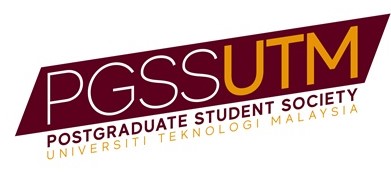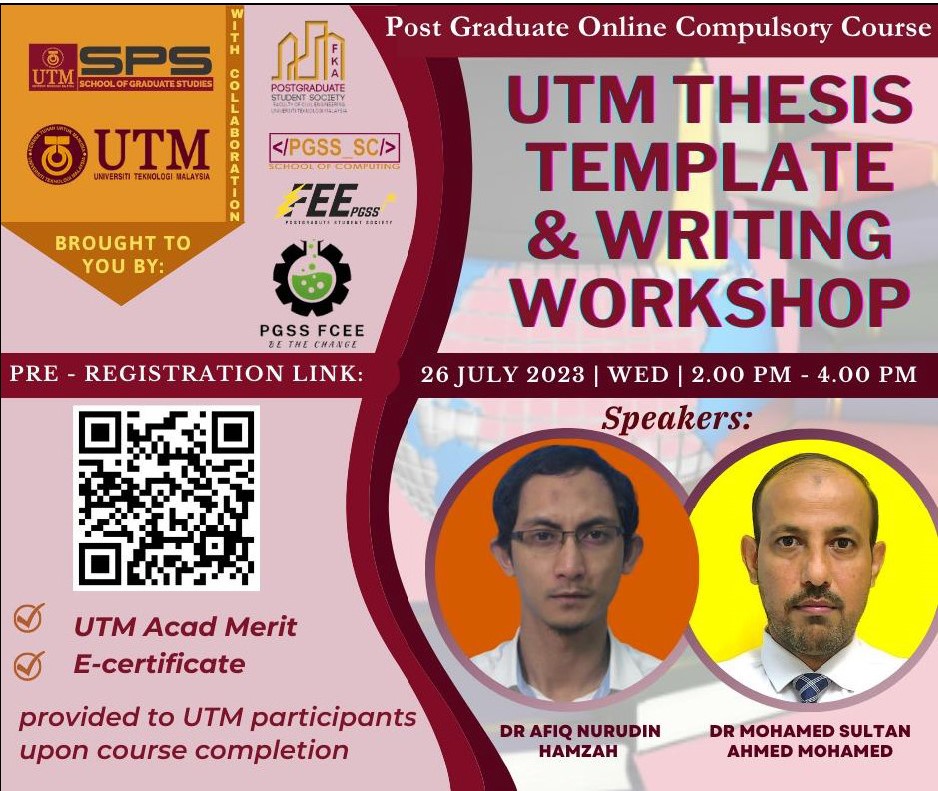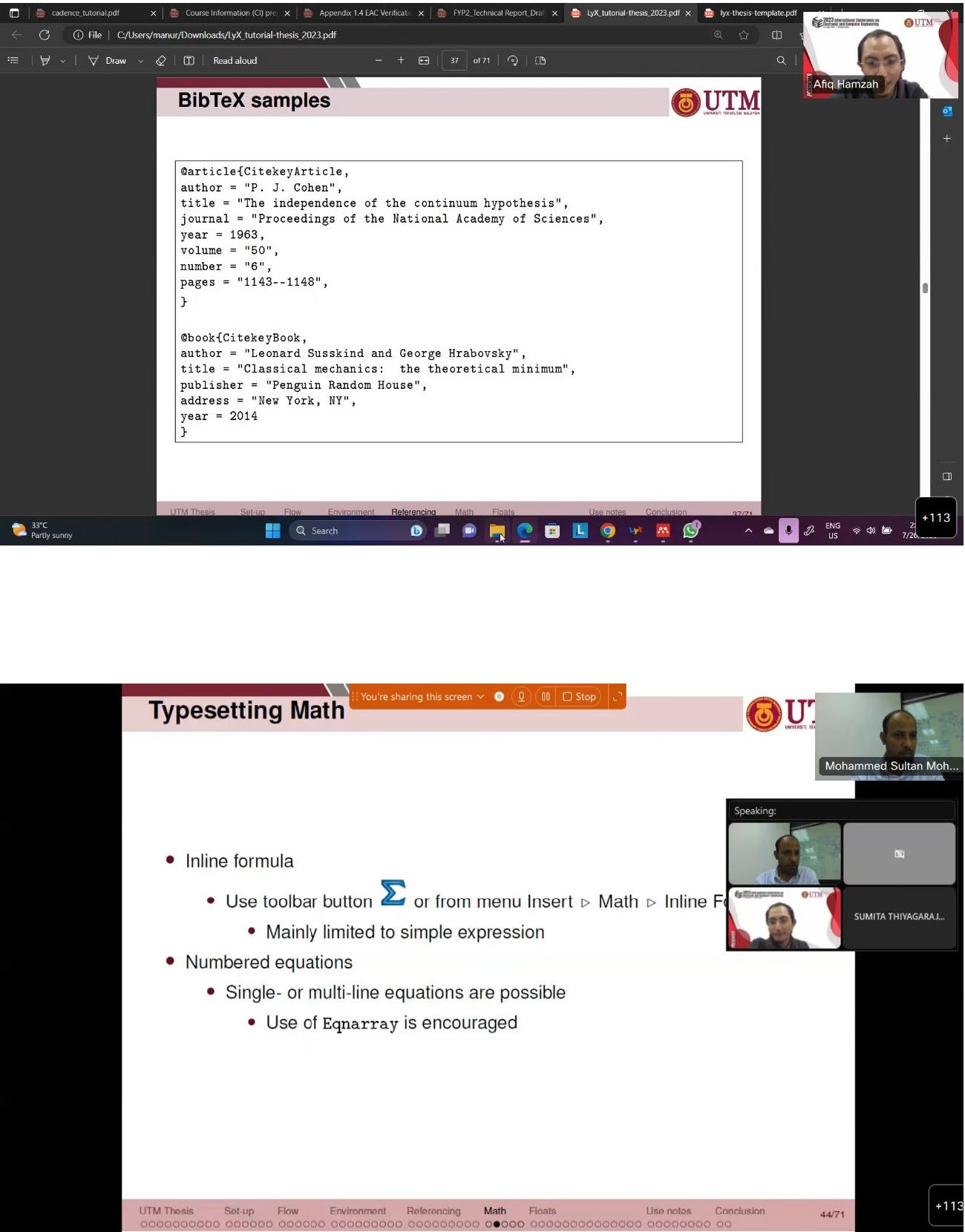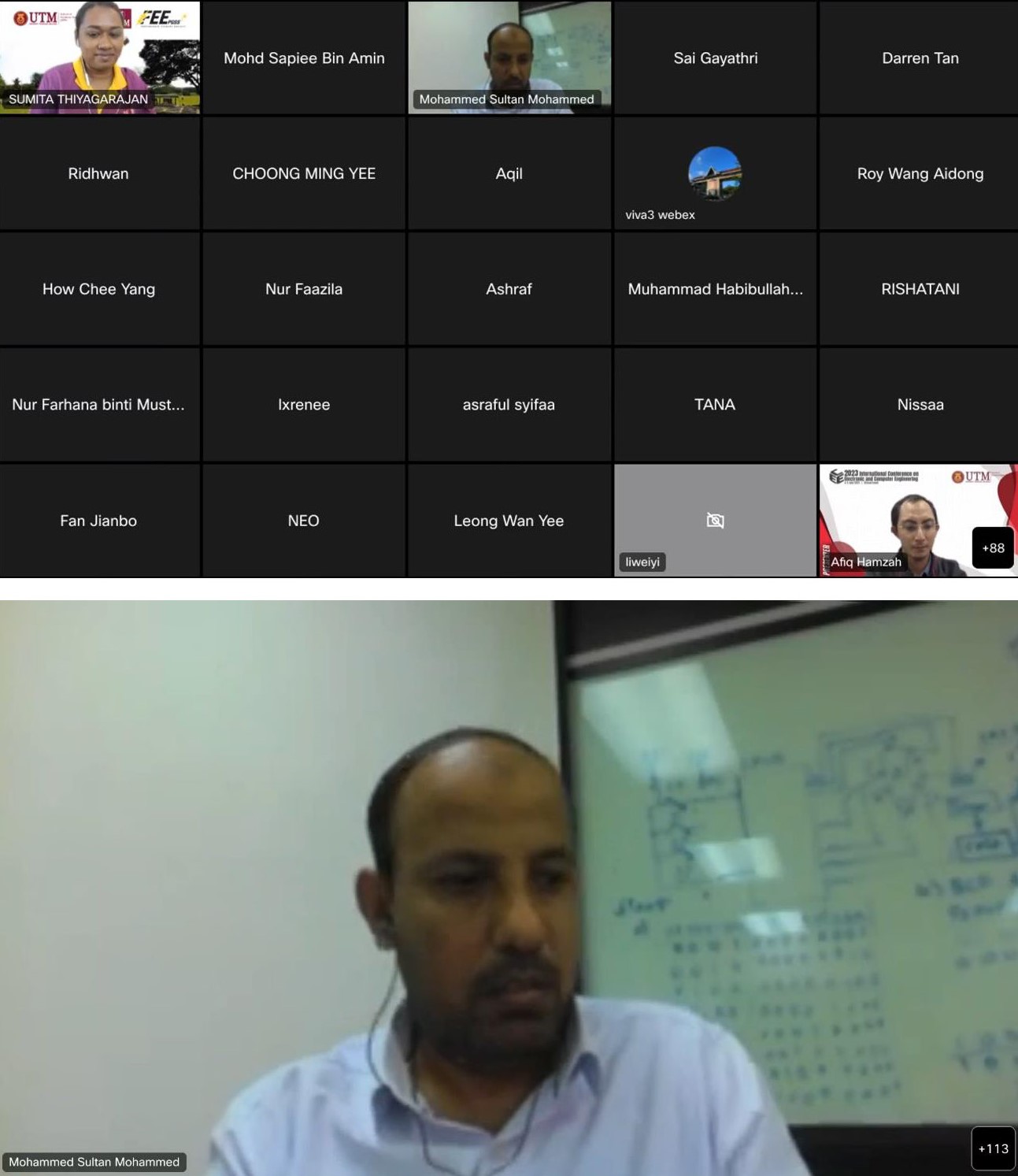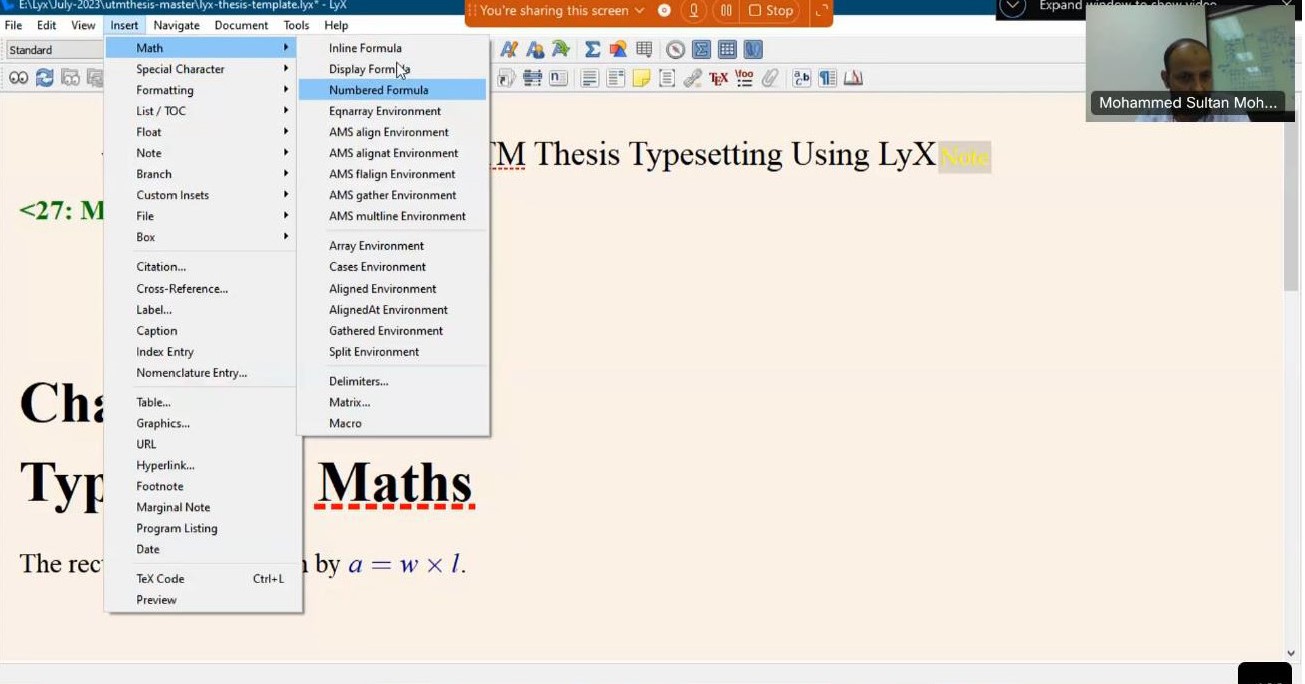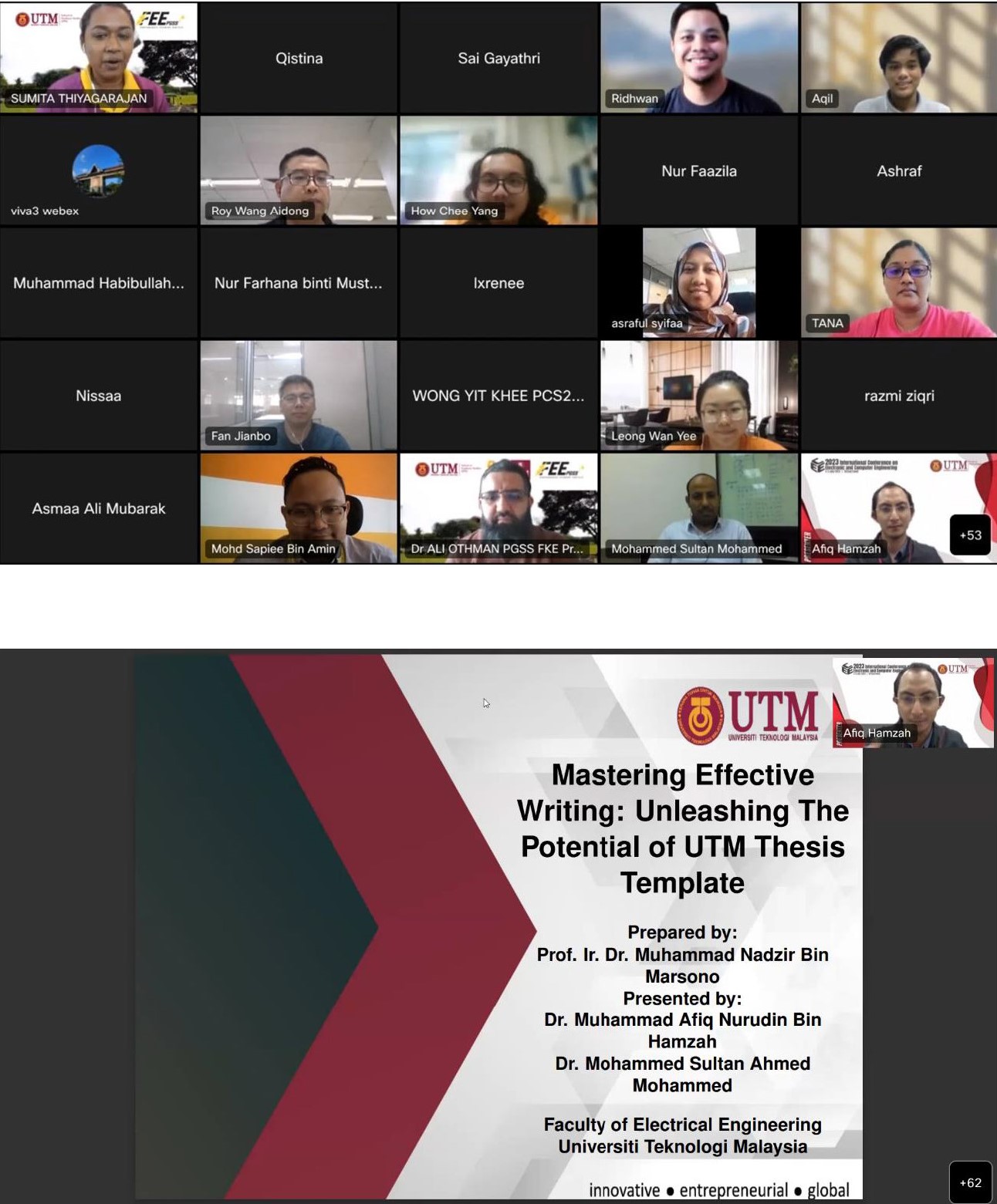27th July 2023, JOHOR BAHRU – An online structured course Mastering Effective Writing: Unleashing the Potential Of UTM Thesis Template was organized to share on the topic of writing UTM thesis using the LaTeX template via LyX. The course is held using Cisco WebEx online conferencing platform. The structured course started at 2pm and ended at 4.10pm. This course was organized by the Postgraduate Student Society Faculty of Chemical and Energy Engineering (PGSS-FCEE), in collaboration with PGSS-FEE, PGSS-FCE and PGSS-FC. The course was moderated by Ms. Sumita Thiyagarajan. This session was successfully held with all the collaborating members of PGSS from their respective faculties.
There were 105 participants who turned up for the event that had registered. There are 63.8% Ph.D. level participants, 25.7% master’s degree level participants, and 4.8% of undergraduate level participants. We also received participation from UTM staff. Additionally, 91.4 % are from UTM, and the rest are non-UTM participants.
The honorable speakers for the program are Dr. Muhammad Afiq Nurudin Bin Hamzah and Dr. Mohammed Sultan bin Ahmed Mohammed. Dr. Afiq is a senior lecturer at the Faculty of Electrical Engineering, Universiti Teknologi Malaysia, Malaysia. He is a holder of B. Eng (Electrical-Electronics Engineering), M. Eng (Electrical Engineering) and PhD (Electrical Engineering). His research interests include SPICE, compact modelling of semiconductor devices (Graphene-based devices, Multi-gate FETs, Nanowires, Junction less Nanowire Transistor), Numerical TCAD simulator of semiconductor devices (characterization, optimization, tunnel barrier engineering and device reliability), and Processing-in Memory for neural network. Dr. Mohammed Sultan is a postdoctoral researcher in the Department of Electronics and Computer Engineering, Universiti Teknologi Malaysia, Malaysia. He is a holder of B. Eng (Computer Engineering), M. Eng (Computer Engineering and Networks), and PhD (Electrical Engineering). His research interests include computer architecture, Many-core System-on-Chip (McSoC), Network-on- Chip (NoC), thermal and resources management, machine learning, parallel processing, and image processing.
The course starts at 2 pm, where the moderator briefly introducing the speaker, Dr. Afiq, and Dr. Mohammed Sultan’s background. Then, Dr. Afiq started the talk by first reminding the participants to have the LyX and LaTeX software installed as it will be used throughout the course. Then, he continued by showing the outline of the course followed by giving a brief introduction to thesis, organizing ideas, and structuring the thesis. Then, he introduced the UTM thesis manual 2018 and its LaTeX/LyX templates. He also mentioned that the advantage of using LyX compared to just using the MS Word. He also showed the basic flow of using LyX and how to export to PDF format.
Afterwards, he moved on to show a brief overview of the LyX software environment. He then showed the way on how to access LyX online or by using local installation, which requires MikTeX or TeXlive installed before the LyX software itself. Then he gave the link to the UTM thesis template, and the files required to run the template. Afterwards, he demonstrated a more in-depth flow to export the document from the editor to PDF. Next, he showed the basic flow of how to insert the preambles, chapters, section, subsections, bibliography and/or appendices.
Furthermore, he showed a more in-depth flow of inserting the contents and formatting them. He also touched briefly on the basic features such as undo, cut copy paste, find/replace, character formatting and
toolbars. As he was limited by time constraints, he only showed some of the toolbar items. Next, he demonstrated how to label figures/tables and how to cross-reference them in paragraph to ease the writer from having to change manually after any changes. Afterwards, he explains further on how to add bibliography and adding the BibTex entries, then how to add the citations in paragraphs.
The session is then continued by passing to the next speaker, Dr. Mohammed Sultan. His focus is on formatting and typesetting mathematical equations and algorithms. He showed the basic insertion of algorithm using the LyX editor. But for multi-row equations, he mentioned it is encouraged to use eqnarray function to manage the equations properly. He then showed the PDF view of the resulting equation. He also showed how to cross reference the equation, in which it is like cross referencing figures and tables.
Next, he showed how to manage floats, which are containers that are used to place figures and table. He explained that caption can also be put as part of the float. Then, he showed the types of float placements and demonstrated how to insert the floats in the LyX editor. While in this topic, he touched briefly on the importance of having some good diagrams/graphs/illustrations. He encouraged the participants to use scalable images compared to bitmap images. As there was not enough time, he had to go faster from now on. He explained further on inserting images and tables. For inserting table, Dr introduced on how to insert the table script using a table generator website. He also showed how to manipulate table in the editor such as resizing. For the algorithms, LyX does not support natively, and need to download the style layout for algorithm in LyX. He demonstrated on how to add the style layout and then how to insert algorithms in the editor.
Before ending his part of the talk, he touched on the importance of spell checking and encouraged to use spellchecker in LyX. He also suggests on using the track document changes feature for helping supervisor to know which part is changed. Then he showed a list of specialized packages that is included in the template and told the participant to avoid including them again. Another tip he gave is before finalizing the document, the writer may need to do fine typesetting to fix paragraph and floats placements. Finally, he showed how to ensure single sided document.
The speaker’s session ended around 3.55pm. Afterwards, a short Q&A session was held until around 4.05pm. There were many excellent questions and the speaker managed to answer all the questions. To wrap up the course, a photography session was held, and the moderator took screenshots of all the participants. Overall, structured course was held without any major issues.
To conclude, the participants appreciate all the efforts by the SPS UTM and PGSS FCEE as the organizers. Additionally, 93 out of the 105 participants rate this structured course 4 and 5 stars in terms of the overall rating. From the feedback, the participants are very satisfied with Dr. Afiq and Dr. Mohammed Sultan’s sharing of the UTM thesis template, but some improvements can be made, with the most comment is on the time constraint and should be extended for future workshops. This course outcome will give a boost to motivation for PGSS FCEE to organize more workshops like this.
